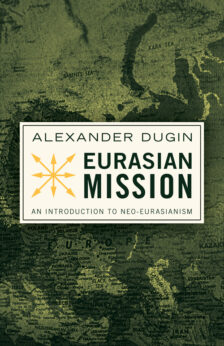There has been a lot of talk about cultural Marxism, which has become a common term among conservatives and Identitarians for various modern leftist movements and streams of ideas that are changing our societies by subverting our cultural foundations and the prevailing values within our civilisation. The main premise is that the modern left-wingers, inspired by the works of the Italian Marxist Antonio Gramsci and the Jewish intellectuals of the Frankfurt School, have realised that the best way to create a multiracial classless egalitarian global village is by subverting cultural norms. This caused them to change their focus from economic questions to cultural war. While street protests are still a large part of this war, the main battle strategy is “the long march through the institutions,” a term coined by a German leftist student leader — Rudi Dutschke.
There is some ambiguity regarding the term cultural Marxism. The cause for this is that it is being used by a wide array of groups and authors, from centre-right political parties to various Identitarian groups and the Dissident Right. It is also used to denote many different evils that are caused by the leftist agenda. While describing how the mainstream media has labelled the term as a part of “far right” and “neonazi” lingo, conservative author Paul Gottfried touches upon this question in his book Antifascism: The Course of a Crusade (Cornell University Press, 2021), where he writes that cultural Marxism is “admittedly not the best term to designate what is meant here,” adding that “[t]he term actually describes a particular movement for change that combines some elements of Marxist socialism with a call for sexual and cultural revolution”. He highlights that “[s]uch signature cultural Marxist positions as attacking traditional gender roles and Western national identities first surfaced among interwar cultural radicals with Marxist leanings and later became integral to the antifascist Left”. To recognise this lineage is to note the obvious, and so is the perception that what is described as ‘cultural Marxism’ is only distantly related to traditional Marxism and therefore should be qualified with the adjective ‘cultural’. With that being said, we should be careful when talking about cultural Marxism, as the many movements and ideas that fall under its umbrella are not the only ideological and cultural weapon, used by globalists through their proxies, such as the mainstream media and the useful idiots of the Left. There is another phenomenon that is the other side of the globalist coin, which also targets and subverts cultural norms and values. But this other phenomenon is seldom mentioned by “moderate” conservative politicians who are always warning us about the scourge of cultural Marxism since they themselves are, in many cases, supporters of liberal capitalism while blaming everything on the leftists.
This other problem that is poisoning the well of our culture just as much as the leftist subversion can be defined as the culture of consumerism, cultural consumerism or even cultural capitalism. Liberal capitalism as we know it today does not serve the best interests of the European people, but wants to subdue all nations, their way of life and their traditions to its own will and thirst for power. As Dominique Venner points out in his short book For a Positive Critique (Arktos, 2017): “The capitalist oligarchy is indifferent to the fate of national communities. Its goal is to satisfy an insatiable will to power through the economic domination of the world. Mankind and its civilisations are sacrificed upon the altar of its materialistic designs which parallel those of Marxism. For technocrats and communists, man is but an economic animal endowed with two functions: produce and consume.” Regardless of the fact that some leftists are still critical of neoliberalism or capitalism, at least in theory, they are, in fact, working hand in hand with the big corporations to bring about the brave new world of global citizenship. For leftists, discrimination and “hate” can only be abolished if we abolish borders, nations and different peoples through racial miscegenation and the mixing of populations, until everybody will only see themselves as “human beings” with no additional ethnocultural identities. On the other hand, the liberal oligarchy and the globalists want the free flow of people, goods and capital across the globe. This way they can freely do business and establish firm control over the vast masses of the Earth, the masses of workers and consumers. We should also not neglect the fact that many of the globalists are Jewish. Unlike the average deracinated businessman or a liberal politician, who, as Venner notes, does not care about his ethnocultural heritage and the faith of his compatriots, the prominent Jews among the international elites have their own ethnocentric goals, and are guided by their ancient belief that they are the “chosen people”. According to the French author Hervé Ryssen, “The Jewish people consider themselves the bearers of a project governing humanity as a whole, a grandiose project which they have pursued for centuries, through and despite everything: the instauration on earth of universal and lasting peace” (“Understanding the Jews, Understanding Anti-Semitism”, The Barnes Review, 2003).
Mass migrations from the third world, the open border policies and the racial diversification of the West are the most common examples of the shared interests of both the Left and liberal capitalism. But while many “mainstream” moderate conservatives will have us believe that we should put the blame solely on cultural Marxism, the main driving force behind migrations and the creation of multicultural societies are, in fact, big corporations and the liberal political class. It is not only the Left that is importing masses of foreigners that could potentially become its new voters and could be recruited to vote against the national-conservative parties to save their own hide from being deported, or at least from losing their welfare support. Big companies and wealthy businessmen will also support the great replacement of native Europeans since they are always in need of a cheap labour force and new consumers. The mass migrations are as much a product of the culture of consumerism as they are of cultural Marxism.
The liberal capitalist oligarchy wants to create a world of individuals, uprooted from their ancient culture and traditions, a society of consumers and workers, where the only identity left will be the brands they wear and the products they use. The source of our identity will not be the ancient legends, our customs, traditions or racial heritage. All such traditional notions of human identity and the sense of who we are will be replaced by the clothes we wear, TV series we like to watch, fast food restaurants where we eat, and so on. Everything must revolve around the products that we can buy. To ensure that we keep buying them, the culture of consumerism is creating a modern materialist community in which the product not only has a practical use but also represents the only measure of someone’s social status and prestige. Showing off your wealth is, of course, not something new in human societies, but what is characteristic of our era is that it is becoming the sole factor of someone’s worth, while such attributes as honour, courage or loyalty are becoming less important. The old gods and their blessings are not needed anymore. There is a modern god that can bestow new divine gifts on us in the form of products. His name is Money and his churches are the shopping malls.
The culture of consumerism is poisoning the West and degrading the descendants of once proud peoples just as much as cultural Marxism. It is detrimental to both our spiritual and physical health. It is turning people into empty shells that are ready to be filled with all kinds of poison. The creative spark that is a part of human nature, especially among Europeans, is being extinguished as people are passively consuming commercial content offered by the entertainment industry. Such things as watching series and movies or playing video games, which used to be just pastimes to help people relax after a day of work, are becoming a central part of many young lives, not to mention the obsession with social networks. Instead of finding creative hobbies, people are content to go with the path of least resistance, throwing away hours of their lives for unfulfilling content and being mostly passive observers instead of doing something themselves.
The path of the least resistance is the path of a consumer in a society dominated by a liberal mindset. If we return to Dominique Venner’s conclusion about the nature of both Marxism and capitalism, man is seen only as an economic animal, as a worker and as a consumer. In other words, as a completely material being without any essential needs beyond having a full stomach and feeling comfortable. Following this logic, liberalism tries to convince us that to feel happy and fulfilled we only have to serve our physical needs. It completely neglects the spiritual needs and aspects of man, except when it can manipulate them to sell something. Man should forget about his outdated traditions, customs and heritage. Instead, he should pursue goals that enable him to keep on satisfying his most basic needs for food, sex and comfort. But because the main aim of liberalism is to create profit and establish control, it does not only tell us that it is completely acceptable to take the path of least resistance, but that this is the preferred way, the best path to take. Values and traditions that strive for excellence are frowned upon in modern societies as something foolish, while mediocrity is celebrated. According to the modern liberal mindset, a person should only strive for the best results when money and career are involved, since with a bigger paycheck he or she will have more money to indulge in various new ways of satisfying basic needs and will be able to buy more stuff.
By convincing the nations of Western liberal democracies that, except when they have to earn to spend, the most comfortable option is the best option, liberal elites become richer, while at the same time, they neutralise any possible threats against their globalist oligarchic regime by making the people softer, weaker, and more docile. Instead of finding a partner and maybe starting a family, young people can just watch pornography. Instead of experiencing real adventures in the natural world, with all of its charms and dangers, they can just play video games. And if they decide to visit nature, there are countless ways to do so, without actually breaking a sweat, with different transportation that will keep them comfortable. There are, of course, still many people who enjoy a proper hike or climbing mountains, but in the spirit of cultural consumerism, they are being persuaded over and over again that they should just pay for the transport and enjoy it in comfort instead of risking sore muscles the next day. The enthusiasm for adventures, creativity and active life, in general, is being pushed out by false promises of achieving happiness without stepping out of your comfort zone. But we should ask ourselves: do we feel more fulfilled and alive after a day of hiking, spending time in the great outdoors, or doing something creative, or after a day of eating junk food in front of a computer screen?
While cultural consumerism leaves us feeling weak and empty, it also sees people just as cogs in the machine. As such, they are completely interchangeable. If a cog breaks, it can be replaced, and if there is a cheaper cog that can be imported from another part of the world, then that is the most reasonable choice from the view of the liberal mindset. It is precisely this view, led by cold materialism, that wants to solve the problems of the demographic winter in Europe by importing “replacements” from the third world. On the other hand, it is also one of the reasons for the demographic downfall as it convinces both men and women to put their careers first and, in the meantime, to live as carefree as possible. This is just as destructive towards the family and nation as cultural Marxism. But if cultural Marxism is mostly hostile to our traditions and cultural heritage, cultural consumerism has a different approach. It does not only see national culture, history or traditions as an obstacle to the borderless world but also as an opportunity. It degrades and exploits once-sacred traditions, rituals, historical monuments and symbols by diminishing them to something that can be traded. Once important rituals and historical sights become entertainment for tourists. Ancient symbols and heroic or mythical figures from our history become the names or logos of the brands on the shelves of shopping malls, and so on. What was once held sacred becomes just another product or service that can fill the pockets of merchants. This is an attitude of a truly soulless society.
This is why when we talk about the ills of modern society, we should not only criticise cultural Marxism but also focus on cultural capitalism — or liberalism — and on the culture of consumerism that has poisoned the soul of the West and is stretching its claws all across the world, hoping it will prevail over all peoples and nations of the planet. It is like a giant steamroller levelling the diverse surface of humanity into one unrecognisable mass of tame workers and consumers. McDonald’s in every village, Coca-Cola on every table, a smartphone in every pocket, and a television with a Netflix subscription in every living room. Multiracial and possibly LGBTQ+ families gather by the table to enjoy any brand of soft drink and a takeout, prepared by the local fast food or an “ethnic” restaurant. Such is the glimpse of the future that is already taking shape. To reject this poison we should simply stop looking for happiness and fulfilment in the constant buying of new things and in being only passive consumers. The first step is to become the main character of your own life, to search for real-life adventures and to reawaken the spark of creativity within your soul.










Sounds like consumerism is more deadly